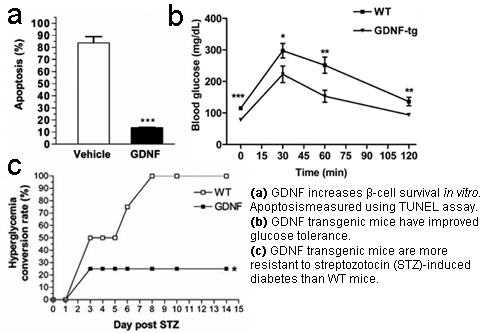Neurotrophic Factor as Therapeutic for Diabetes
Application
The use of Glial Cell-derived Neurotrophic Factor (GDNF) or its mimics as a potential therapeutic for diabetes mellitus type 1 (IDDM).
Key Benefits
- GDNF enhances pancreatic β-cell growth and survival in vitro and in vivo.
- GDNF transgenic mice have lower blood glucose levels and are more resistant to developing diabetes compared with wild-type mice.
Technical Summary
Emory investigators have demonstrated that GDNF, a potent survival factor in the nervous system, can also enhance the survival, proliferation and function of the insulin-producing pancreatic β-cells. They found that these cells express key GDNF receptors. In response to GDNF administration, β-cell survival is increased in vitro and in vivo via activation of the pro-survival PI3K pathway. Moreover, GDNF transgenic mice were found to have lower blood glucose levels, higher insulin levels and were resistant to diabetes compared to wild-type mice. Thus GDNF could be used as a novel treatment for IDDM, to increase the health and survival of β-cell transplants, or as a target for developing new therapeutics. Current treatments for diabetes center on early diagnosis and management of blood sugar levels through exercise, diet, self-glucose monitoring and insulin injections. While these lifestyle changes provide one avenue of treatment, long-term follow-through and a continued progression of the disease can render such treatments less useful. Transplantation of exogenous pancreatic β-cells is a promising method to control diabetes by restoring the body's capacity to produce insulin. Transplanted β-cells however suffer from poor health due to autoimmune tissue rejection and the limited supply of donor tissue. Thus, development of methods to enhance the production and functions of β-cells is important in islet transplantation. GDNF and its mimics could potentially be used in this regard both pre- and post-transplantation.

Developmental Stage
In vitro studies confirm the beneficial effects of GDNF on pancreatic β-cells and in vivo proof of principle has been demonstrated in rodent models of diabetes.
Publications
Anitha M et al (2006), The Journal of Clinical Investigation, 116:299-302.
Mwangi S et al (2008), Gastroenterology,134(3):727-37.
Patent Information
| App Type |
Country |
Serial No. |
Patent No. |
File Date |
Issued Date |
Patent Status |
| Utility (parent) |
United States |
11/936,413 |
8,637,459 |
11/7/2007 |
1/28/2014 |
Issued |
| Divisional |
United States |
14/108,531 |
9,133,441 |
12/17/2013 |
9/15/2015 |
Issued |
|
|

